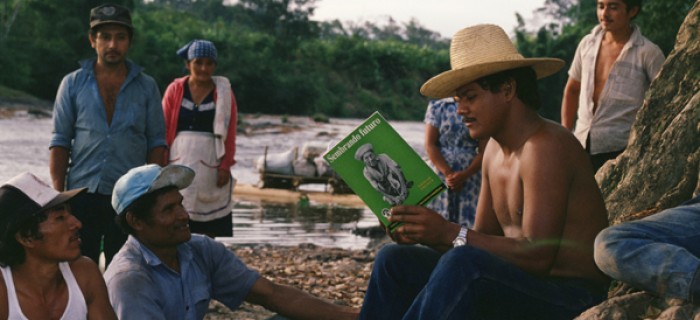Movimiento Campesino a Campesino: Linking Sustainable Agriculture & Social Change
Food First Backgrounder, Winter/Spring 2006, Vol. 12, No. 1
For thirty years, the Movimiento Campesino a Campesino, now with several hundred thousand farmer-promoters, has helped farming families in the rural villages of Latin America improve their livelihoods and conserve their natural resources. The promoters of MCAC have shown that, given the chance to generate and share agroecological knowledge freely amongst themselves, smallholders are perfectly capable of developing sustainable agriculture, even under highly adverse conditions. The capacity to develop agriculture locally is not only the agroecological key to sustainable agricultural development, for campesinos it is a matter of survival. This explains in a very fundamental way why the movement has spread as widely as it has. It works!
Agroecology is not just a collection of practices. Agroecology is a way of life… We can’t have an agroecological change without a campesino movement. – Nelda Martínez, Nicaragua
However, the Campesino a Campesino experience still leaves us with the question: If sustainable agriculture is so great, why aren’t all campesinos doing it? What keeps it from scaling up? Why is it still the exception rather than the rule?
The transition to sustainable agriculture ultimately depends on a combination of efforts between farmers and economic and social institutions; the markets, banks, government ministries, agricultural research institutions, farmers’ organizations, churches, and nongovernmental/nonprofit organizations (NGOs). Each of these institutions—including the market—has its own strengths and weaknesses; and each responds to the political agendas of the actors who are able to use it. Scaling up the successes of any experience in sustainable agriculture, including MCAC, is therefore not simply farmers teaching other farmers to farm sustainably, but a political project that engages the power of these institutions to permit, facilitate, and support sustainable farming.
Smallholders have relatively little control over the institutions shaping agriculture. If MCAC has provided them any influence at all, it is because the movement’s successes expose the glaring failures of conventional agricultural development. Though they may still be just “islands of sustainability,” MCAC’s farmers have tremendous social and political potential, simply because conventional agriculture has failed to produce anything better—for campesinos, for the environment, or for the food security of the millions of poor rural and urban dwellers in Latin America. However, without structurally enabling institutional changes, a few hundred thousand agroecological smallholders will not tip the balance away from conventional to sustainable agriculture.
If activists for sustainable agriculture expect to have a social impact on political and economic structures, they will have to integrate their advocacy to ground-level campesino struggles for sustainable livelihoods.
Campesino a Campesino’s extensive knowledge networks have been highly successful in generating and spreading sustainable agricultural practices on the ground. In effect, MCAC has decentralized the practice of agricultural development. This is both a measure of and an explanation for its successes. If agriculture is to be sustainable, it must not only be based on the ecology of the specific agroecosystem where it is being practiced, it must evolve from the social structures and cultures in which the system itself is embedded. But if sustainable agriculture is to become the norm rather than the exception, then these embedded, agroecological experiences must scale out, geographically; and up, into the institutions that shape agriculture’s social, economic, and political terrain; and in, into the culture of agriculture itself. To go to scale, Campesino a Campesino must not only be effective on the ground; it needs cultural, social, and political power to affect the structures and policies that hold back the development of sustainable agriculture.
Stay in the loop with Food First!
Get our independent analysis, research, and other publications you care about to your inbox for free!
Sign up today!

 Help Food First to continue growing an informed, transformative, and flourishing food movement.
Help Food First to continue growing an informed, transformative, and flourishing food movement.




